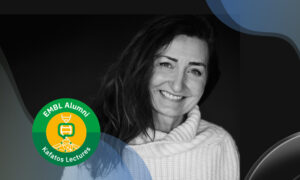
Cellular synergy
Combining synergies, science and shared visions, experts from EMBL Monterotondo and the Institute for Molecular Oncology (IFOM) came together for their first joint symposium, 29–30 June in Milan. Focussing on cell biology mechanisms in health and disease, the two-day conference included an extensive programme of presentations, networking and exchange. We caught up with alumnus Thomas Vaccari, now a principal investigator at IFOM, who was a speaker at the event.

What are you working on?
Our lab is interested in understanding how vesicles going to and from the cell’s ‘digestive factories’, lysosomes and endosomes, contribute to intracellular signalling, in both health and disease – for example in tissue and organ development or in cancer. In my talk, I discussed our recent findings on molecules that mediate these processes and how they could influence cell division and potentially cancer – an exciting observation that has inspired us to venture into a completely new field.
Which areas of research during the conference did you find particularly interesting?
There were some fantastic talks on a wide range of areas such as epigenetics, cell cycle control and cell plasticity. I really appreciated the work presented by Martin Jechlinger and Rocio Sotillo, which mirrored some of our interests in cancer studies. I also loved the talk by Cornelius Gross – his research has a distinctly different focus to ours, but he presented a wonderfully elegant approach to studying fear, which is such an intricate and elusive subject.
Cornelius Gross presented a wonderfully elegant approach to studying fear, which is such an intricate and elusive subject.
How did you first become interested in cell biology?
My interests originated at EMBL Heidelberg, where I did my PhD in Anne Ephrussi’s group, studying how certain molecules within developing Drosophila oocytes migrate to specific regions, thus controlling the development of the fly’s body. Anne was a great mentor, and I have fond memories working in her team. Not only did I have a terrific formal training and access to a global web of contacts, but working at EMBL instilled in me a deep love and wonder for science and discovery that still drives me today.
What do you think the future holds for the field?
We are on the way to understanding how amazingly adaptable the cell’s endosomes and lysosomes are to the environment and the specific needs of the cell. Cells in the gut, kidneys, immune cells and skin cells are hugely creative in how they use their machinery, and crucially we will begin to understand how such processes are hijacked in several types of cancer.


